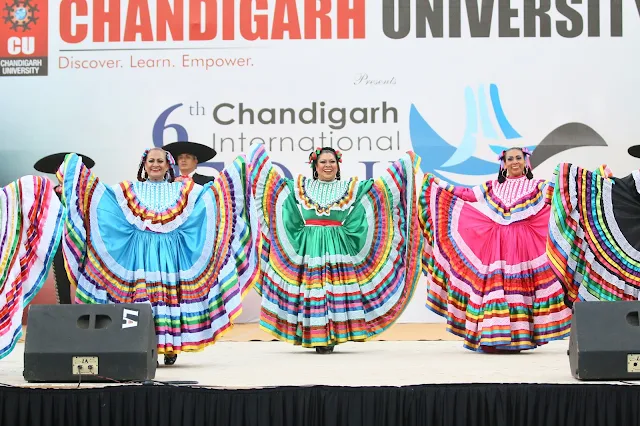International Folk Festival to promote foreign culture and introduce
cultural competence to the Chandigarh University students.
Written by Anne-Sophie
Art is often used as a medium for
introducing a culture. Culture is beyond what defines a nation. It is a set of
beliefs, values and traditions shared by a particular group of people in which
they recognize themselves. In a country like India, there is no such thing as
the “Indian” culture. India is a very diverse environment with various and very
distinctive cultures mixed on a same ground. Punjabis, Hindus, Sikhs, Nepalese
diaspora... all living on the same land but offering a large collection of
songs, music, dance, traditions, practices and values unique to their own
culture.
At
Chandigarh University (CU), we are proud to be an international campus and we
are excited to display the various range of culture present on our ground. This
was the purpose of the 6th International Folk Festival held on
November 14th. CU guests of honour, a troupe of Mexican artists,
shared the stage with artists from Bhutan, Thailand, Nepal and India as well,
and performed songs and dances which offered us a taste of their home culture.
Representing
one’s culture and being represented is important for people as this is the
highlight of their belonging to a specific group of people. Andrea, a
Mexican student at CU, mentioned that while seeing the Mexican performance, she
“felt like home”. To her, this performance was a way for Indians and other
internationals to “see a part of the culture through which someone recognizes
you.” André, Brazilian intern at CU, explained that folklore is also a way to
understand where people come from and learn about their traditions and roots.
In his mind, what makes Mexicans who they are today are those happy dances and
colourful dresses that were exhibited.
If
not a problem of feeling part of a community, being exposed to a different
culture is a matter of acculturate ourselves and others around us. I, French
intern living in India, am exposed to a culture diametrically opposed to mine.
I had to re-learn how to dress, behave, be open-minded and understand Indian’s
culture and values in order to make my way every day. Ground zero. I start my
journey by erasing all I know about India and just throw myself in the Indian
jungle. New English, new way of working but same smile. Being culturally aware
of those challenges is the key to work with people from diverse cultural
background and achieve organizational objectives. However, to most people on
campus, it sounds challenging to deal with international students. We are
stared at, face language barrier, shyness, loneliness and most of all we are
far from home.
Having
those short episodes of cultural competence and cultural exposure are as
important to foreigners as to the hosting country. Cultural exchanges are the
most fulfilling experiences for going global, thing that every country is
nowadays facing. Caucasians, Hispanics, Blacks, Asians... We are all worth
talking to more than been talking about.






